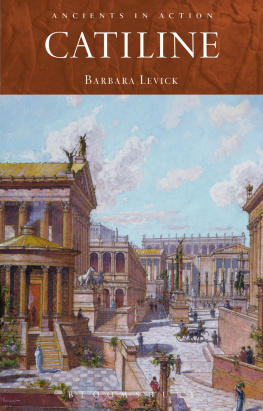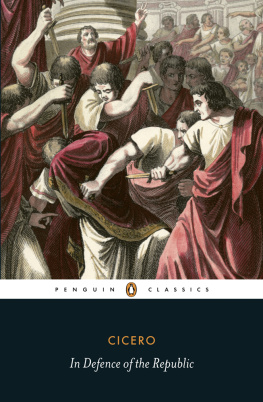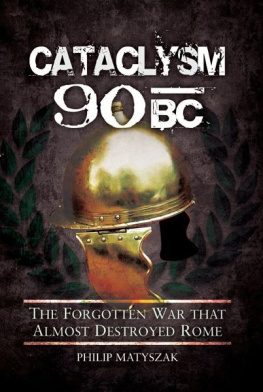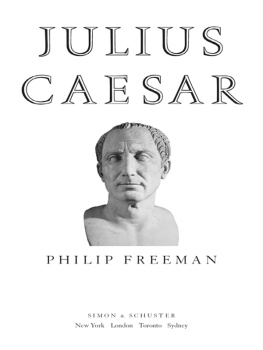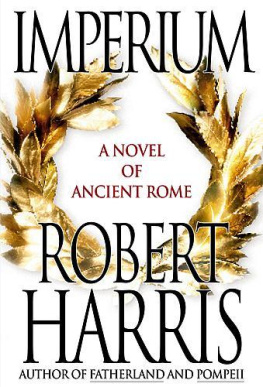Catiline
ANCIENTS IN ACTION
Boudicca
Marguerite Johnson
Catullus
Amanda Hurley
Cleopatra
Susan Walker and Sally-Ann Ashton
Hadrian
James Morwood
Hannibal
Robert Garland
Horace
Philip D. Hills
Lucretius
John Godwin
Martial
Peter Howell
Ovid: Love Songs
Genevieve Lively
Ovid: Myth and Metamorphosis
Sarah Annes Brown
Pindar
Anne Pippin Burnett
Sappho
Marguerite Johnson
Spartacus
Theresa Urbainszyk
Tacitus
Rhiannon Ash
To Ray and Judy Forsyth
in whose garden I began to write this book
Catiline
Barbara Levick
Contents
Destruction of Carthage by P. Scipio Aemilianus.
Tribunate and murder of Tiberius Gracchus.
12321 Tribunates and murder of Gaius Gracchus.
?108 (or 106) Birth of Catiline.
Births of Cicero and Pompey the Great.
Sixth consulship of C. Marius. Lynching of L. Appuleius Saturninus and C. Servilius Glaucia. Birth of C. Julius Caesar.
Tribunate and assassination of M. Livius Drusus. Outbreak of Social War.
Siege of Asculum.
First consulship (joint chief magistracy) of L. Cornelius Sulla. Outbreak of Civil War.
Seventh consulship and death of Marius.
Sullas return from the east.
8281 Defeat of Marians; Sulla becomes Dictator and establishes Senate in power.
Sullas second consulship and his retirement.
?80 Pompeys first military Triumph.
?78 Catiline holds quaestorship (junior magistracy, qualifying for membership of Senate).
7877 Consulship and rebellion of M. Aemilius Lepidus.
7771 Pompey in Spain defeating rebel forces under Q. Sertorius.
7471 Revolt of slave gladiator Spartacus.
M. Licinius Crassus and Pompey, consuls, restore power of tribunes (representatives of the plebs).
Catiline praetor (second highest magistracy, carrying imperium , power of command).
Catiline governor of province of Africa. Lex Gabinia gives Pompey command against the pirates.
Cicero praetor (magistrate with power second only to that of consuls). Lex Manilia gives Pompey command against Mithridates VI Eupator of Pontus.
6665 First Catilinarian conspiracy.
Catiline acquitted of misgovernment in Africa.
6663 Pompey defeats Mithridates.
Catiline fails to be elected consul. Catiline acquitted on murder charge.
Cicero consul. Catilines second failure to be elected consul (July).
Conspiracy predicted and revolt of Manlius (21 and 27 October); SCU
Meeting at Laecas house (6 November) and alleged assassination attempt to follow.
In Cat. 1, to Senate (8 November); Catiline leaves Rome.
In Cat. 2, to People (9 November).
Catiline reaches Manlius and is declared public enemy (mid-November).
Defence of Murena.
Allobroges arrested on bridge (3 December).
In Cat. 3 to People; 4 to Sen. (35 December): interrogation, executions, rewards to witnesses.
Defeat and deaths of Catiline and Manlius. Pompey returns from the east.
Trial of P. Clodius Pulcher for infringement of Bona Dea rites.
Julius Caesars first consulship. Recognition of First Triumvirate of Caesar, Pompey and Crassus.
Renewal of First Triumvirate.
Second consulships of Crassus and Pompey.
Outbreak of Civil War.
Pompey, defeated by Caesar, is assassinated in Egypt.
4844 Caesar Dictator; assassination on 15 March 44.
Formation of Second Triumvirate of Mark Antony, M. Lepidus and Octavian.
Renewal of Triumvirate.
Octavian defeats Antony and Cleopatra VII of Egypt at Actium.
Deaths of Antony and Cleopatra in Alexandria.
Triple Triumph of Octavian.
Restoration of a functioning constitution completed. Octavian takes name of Augustus. Beginning of the Principate the Roman Empire of the first three centuries AD.
Lucius Sergius Catilina is the equivalent of Britains Guy Fawkes. Both villains planned the overthrow of governments (63 BC and AD 1605). Both failed, died along with fellow-conspirators, and became bogeymen whose names resounded down the centuries in their own societies and beyond. The atrocity of the offences and the danger they presented made them unforgettable.
The parallel with Guy Fawkes is not exact: Catiline was more than the foot-soldier Fawkes, and whatever he planned (slaughtering the magistrates, burning the city, seizing power) lacked the overtly religious dimension of the English conspiracy; but it adds to the reasons for examining the affair, which are already powerful. First, the conspiracy of 63 led to the formation of the First Triumvirate of 59, the informal and destructive alliance between Marcus Licinius Crassus, Gnaeus Pompeius (Pompey the Great) and Gaius Julius Caesar; so it was a significant event in the fall of the Roman Republic and the establishment of the Principate under Augustus, a monarchical form of government that was to mutate and survive in the eastern half of the Roman Empire until the fall of Constantinople to the Turks in 1453. Second, it was the subject of work by two literary giants, Cicero (10643 BC), whose oratory was crucial in bringing about the execution of the senatorial conspirators, and Sallust ( c. 8635 BC), the historian who devoted his first great monograph to it. Third, it offers some of the pleasures of a detective story, with divergent and gappy evidence written up of course by the winning side and providing a teasing problem of unreliable narrators. The received version, Ciceros, was followed uncritically until the later nineteenth century, when E. A. Beesly, a radical Professor at London University, reversed the roles of hero and villain and turned Catiline into a popular champion. Controversy flamed on. Like Guy Fawkes, Catiline and his followers have champions who argue for a frame-up. Two alternative versions of this view have proved persuasive: K. Waters, that the consul Cicero invented the threat to the Republic in order to qualify for a position equal or superior to those of its two leading politicians, Pompey the Great and M. Licinius Crassus; R. Seagers that he provoked an insurrection in order to deal with it, bringing dissidents into the open before Pompey returned with an army from the east. Yet Ciceros version, embodied in the literature, still attracts defenders. Posing the dilemma itself risks falling into the fallacy of false dichotomous questions damned by D. H. Fischer. We have some incontrovertible facts buried in a mass of allegations about what was going on; with varying interpretations of what the actors intended. Controversies of the time have been reported by historians parroting received opinions and vulnerable to this day to their own political prejudices.
Beyond specific problems we find a large-scale tragedy, directly involving the entire political class and eventually bringing it down to humiliation and near-impotence. The individual villain of this episode is part of something grander, the playing out of a drama of ambition and envy that goes back to the legend of Romulus: who killed his twin Remus, co-founder of the city, for jumping over Romulus walls. Every Roman in a sense was a man of action: he stood in the voting assembly and at a signal could pick up his shield and become a fighting soldier. Catiline was not the only man of action in this story: Pompey, who enjoyed three Triumphs, was a supreme man of action less good with words; while Cicero the orator performed one action during his consulship of 63 that was to have powerful consequences and perhaps gave him strength at the end of his life 20 years later to resist the approach of autocracy in the form of Mark Antony and the future Augustus.

